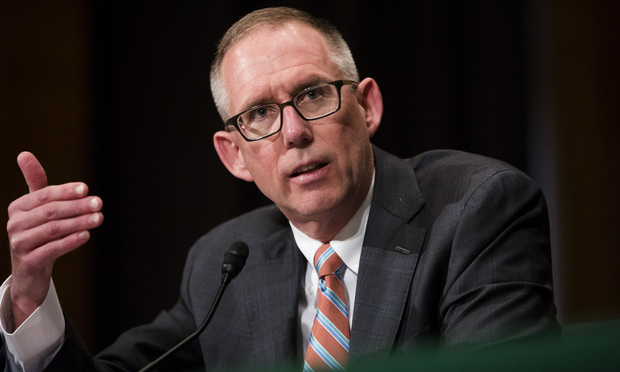Trump's NLRB Is Taking New Look at Restricting Workers' Electronic Communication
Can employees use corporate email and other forms of electronic communication to discuss their workplace? The National Labor Relations Board tees up a fresh test about the scope of protections for employee speech on company property.
August 07, 2018 at 01:00 PM
6 minute read
The original version of this story was published on National Law Journal
 John Ring testifies before the U.S. Senate Health, Education, Labor and Pensions Committee during his confirmation hearing to be a member of the National Labor Relations Board, on March 1.
John Ring testifies before the U.S. Senate Health, Education, Labor and Pensions Committee during his confirmation hearing to be a member of the National Labor Relations Board, on March 1.
In many workplaces, the “water cooler” long ago moved online, where workers exchange news, collaborate and perhaps complain about the boss via email, social media and increasingly popular internal messaging systems.
The National Labor Relations Board now faces a fresh legal battle over such realities of the modern workplace, as companies and regulators seek to reconcile new forms of communication with decades-old labor law that protects speech and employers' property.
The board's Republican majority has asked for briefs in a case that revives a debate over employee use of corporate email to discuss union-related activity. Management-side lawyers contend employers should not be forced to support electronic forums that permit messages they don't agree with.
The board, against the votes of its two Democratic members, is revisiting the 2014 decision Purple Communications, in which the Obama-era panel said employees can use company email for union-related communication.
It's not clear how far the Trump board will go in overturning or adjusting the current standard but there are hints a new decision could extend beyond email. In a notice requesting input, the board said it was “inviting comments on the standard it should apply to evaluate policies governing the use of employer-owned computer resources other than email.”
The NLRB routinely shifts in political winds, depending on who's in power. Trump-appointed NLRB general counsel Peter Robb telegraphed early on that he wanted the board to revisit the scope of the Purple Communications decision. His predecessor, Richard Griffin, had sought to expand the scope of the ruling through dozens of cases that would test the bounds of electronic communication, hardware such as computers and cellphones and instant messaging systems. Robb rescinded that effort.
Communication in the modern workplace continues to evolve. Internal messaging systems such as Slack are more popular than ever, letting workers chat in real time. Message boards are offering employees new digital forums to share ideas—and presenting novel legal risks for companies.
Google last year fired an employee, James Damore, who circulated a memo decrying the tech company's push for diversity at the company. The NLRB upheld the termination as lawful, saying Damore's memo fostered a hostile work environment.
AFL-CIO associate general counsel Matthew Ginsburg said that email communication on company systems should be protected under Section 7 of the National Labor Relations Act.
“I think the question is how these black letter labor law rules apply to the modern workplace where so much employee communication takes place electronically,” Ginsburg said. “Whatever rule the board sets should apply to any employer-provided communication forum employees use to communicate about nonwork topics.”
Ginsburg said any move by the NLRB to shut down union discussions on work email platforms “will invite a slew of discrimination cases. Having to litigate in every case whether the employer permits email discussion of nonwork topics other than unions isn't good for anyone. That's why the current bright-line rule with its exception allowing an employer to show that the rule shouldn't apply to it makes such good sense.”
The union has argued any rule that restricts the substance of email activity will open a door to discrimination charges and complicated questions about blurred lines between work and personal time.
The NLRB is using the 2011 case Caesars Entertainment Corporation to consider anew questions about electronic communication. Chairman John Ring and fellow Republican members Marvin Kaplan and William Emanuel voted to solicit amicus briefs. Members Mark Gaston Pearce and Lauren McFerran dissented. The board set a Sept. 5 deadline to file briefs.
Management-side lawyers contend the NLRB's Purple Communications decision compels employer speech, a violation of the First Amendment.
“The challenged board decision requires employers to give employees free access to corporate email systems for the purpose of communicating pro-union messages with which employers may disagree,” lawyers for Purple Communications wrote in July in a letter to the NLRB. The company is represented by the firms Littler Mendelson and Akin Gump Strauss Hauer & Feld.
Former NLRB member Harry Johnson wrote a sweeping dissent in the Purple Communications case that raised First Amendment concerns. He also rejected any comparison to a traditional water cooler, arguing that email is “by no means a gathering place.”
“This case has wide potential application related to electronic communications in general,” Johnson, now a Morgan, Lewis & Bockius partner, said in an interview. An employer, he said, has no interest in “dozens or hundreds of conversations spawned on its own system at the expense of performing productive work.”
A new test concerning electronic communication, Johnson said, would help employers. “You don't want employers to have to subsidize a message that they don't agree with,” he said. “I think that will be argued in the briefing.”
Read more:
Marketing Analyst Who Gave Trump the Finger Loses Suit Over Her Firing
Why This Quinn Emanuel Litigator (and His Clients) Are Fighting for LGBT Workers
Jones Day Warns of 'Protracted' Fee Fights if Circuit Ruling Is Upheld
LGBT Workplace Cases Arrive at SCOTUS as Kennedy Punches Out
NLRB Chairman Sets Timeline for Joint Employment Rule-Making
➤➤ Get employment law news and commentary straight to your in-box with Labor of Law, a new Law.com briefing. Learn more and sign up here.
This content has been archived. It is available through our partners, LexisNexis® and Bloomberg Law.
To view this content, please continue to their sites.
Not a Lexis Subscriber?
Subscribe Now
Not a Bloomberg Law Subscriber?
Subscribe Now
NOT FOR REPRINT
© 2025 ALM Global, LLC, All Rights Reserved. Request academic re-use from www.copyright.com. All other uses, submit a request to [email protected]. For more information visit Asset & Logo Licensing.
You Might Like
View All
‘The US Market Is Critical’: KPMG’s Former Head of Global Legal Services On the Big Four Firm’s Legal Arm Entering the US
6 minute read


Trending Stories
- 1Coming This Year: Statewide Case Management System
- 2Adding 'Credibility' to the Pitch: The Cross-Selling Work After Mergers, Office Openings
- 3Low-Speed Electric Scooters and PIP, Not Perfect Together
- 4Key Updates for Annual Reports on Form 10-K for Public Companies
- 5When Words Matter: Mastering Interpretation in Complex Disputes
Who Got The Work
J. Brugh Lower of Gibbons has entered an appearance for industrial equipment supplier Devco Corporation in a pending trademark infringement lawsuit. The suit, accusing the defendant of selling knock-off Graco products, was filed Dec. 18 in New Jersey District Court by Rivkin Radler on behalf of Graco Inc. and Graco Minnesota. The case, assigned to U.S. District Judge Zahid N. Quraishi, is 3:24-cv-11294, Graco Inc. et al v. Devco Corporation.
Who Got The Work
Rebecca Maller-Stein and Kent A. Yalowitz of Arnold & Porter Kaye Scholer have entered their appearances for Hanaco Venture Capital and its executives, Lior Prosor and David Frankel, in a pending securities lawsuit. The action, filed on Dec. 24 in New York Southern District Court by Zell, Aron & Co. on behalf of Goldeneye Advisors, accuses the defendants of negligently and fraudulently managing the plaintiff's $1 million investment. The case, assigned to U.S. District Judge Vernon S. Broderick, is 1:24-cv-09918, Goldeneye Advisors, LLC v. Hanaco Venture Capital, Ltd. et al.
Who Got The Work
Attorneys from A&O Shearman has stepped in as defense counsel for Toronto-Dominion Bank and other defendants in a pending securities class action. The suit, filed Dec. 11 in New York Southern District Court by Bleichmar Fonti & Auld, accuses the defendants of concealing the bank's 'pervasive' deficiencies in regards to its compliance with the Bank Secrecy Act and the quality of its anti-money laundering controls. The case, assigned to U.S. District Judge Arun Subramanian, is 1:24-cv-09445, Gonzalez v. The Toronto-Dominion Bank et al.
Who Got The Work
Crown Castle International, a Pennsylvania company providing shared communications infrastructure, has turned to Luke D. Wolf of Gordon Rees Scully Mansukhani to fend off a pending breach-of-contract lawsuit. The court action, filed Nov. 25 in Michigan Eastern District Court by Hooper Hathaway PC on behalf of The Town Residences LLC, accuses Crown Castle of failing to transfer approximately $30,000 in utility payments from T-Mobile in breach of a roof-top lease and assignment agreement. The case, assigned to U.S. District Judge Susan K. Declercq, is 2:24-cv-13131, The Town Residences LLC v. T-Mobile US, Inc. et al.
Who Got The Work
Wilfred P. Coronato and Daniel M. Schwartz of McCarter & English have stepped in as defense counsel to Electrolux Home Products Inc. in a pending product liability lawsuit. The court action, filed Nov. 26 in New York Eastern District Court by Poulos Lopiccolo PC and Nagel Rice LLP on behalf of David Stern, alleges that the defendant's refrigerators’ drawers and shelving repeatedly break and fall apart within months after purchase. The case, assigned to U.S. District Judge Joan M. Azrack, is 2:24-cv-08204, Stern v. Electrolux Home Products, Inc.
Featured Firms
Law Offices of Gary Martin Hays & Associates, P.C.
(470) 294-1674
Law Offices of Mark E. Salomone
(857) 444-6468
Smith & Hassler
(713) 739-1250








